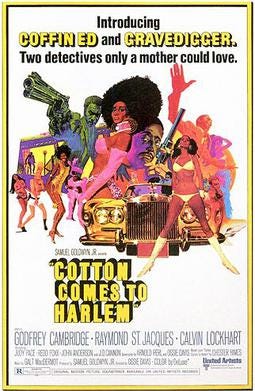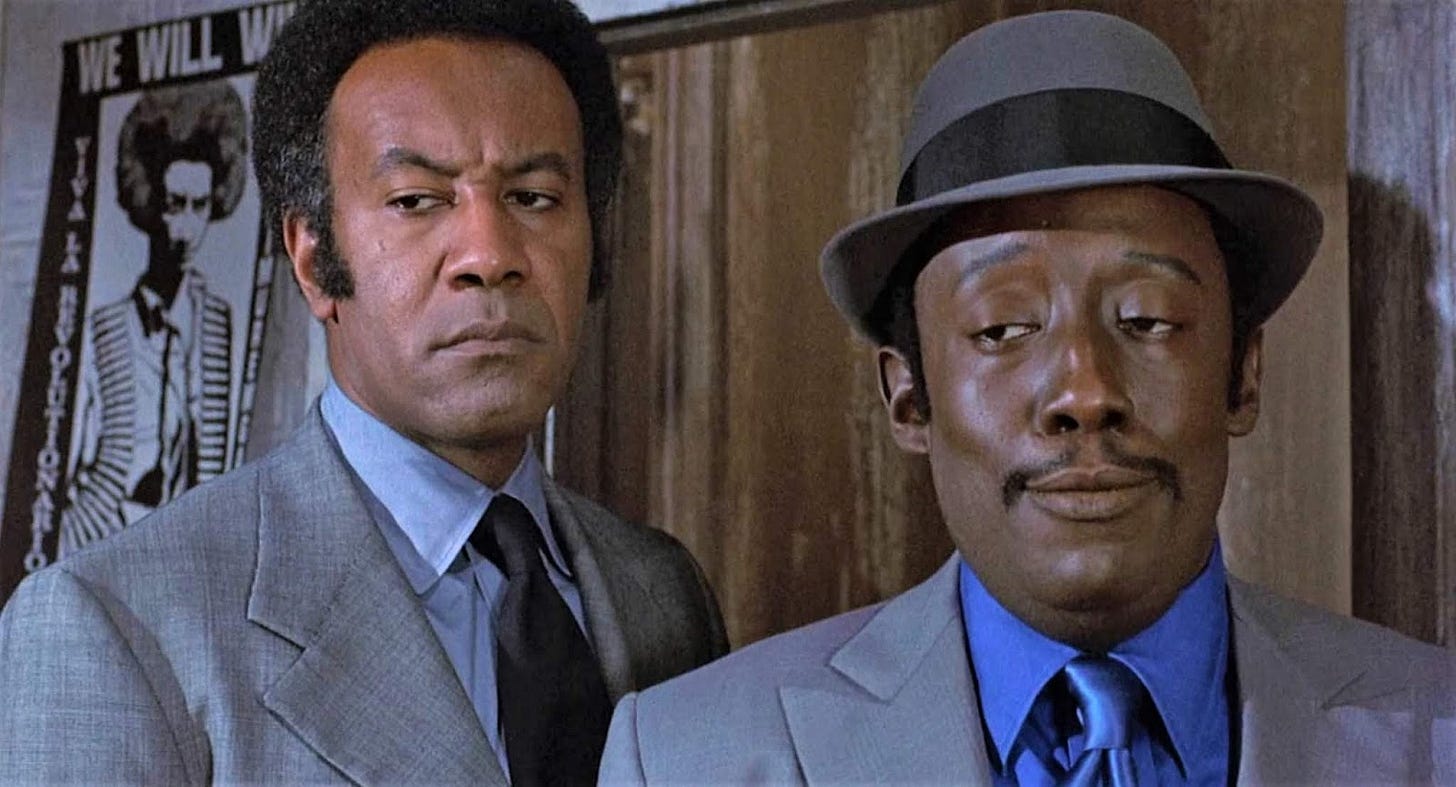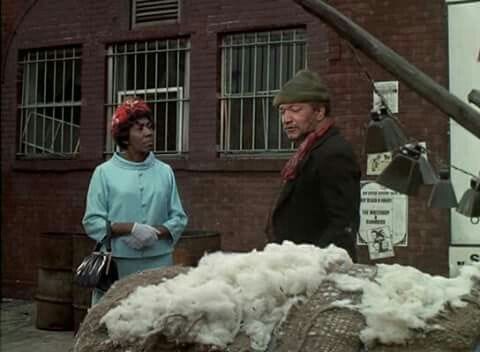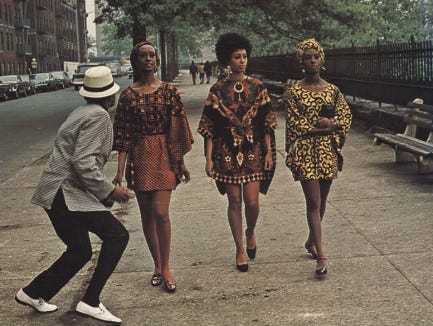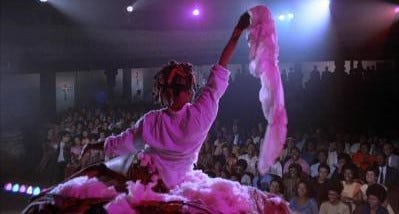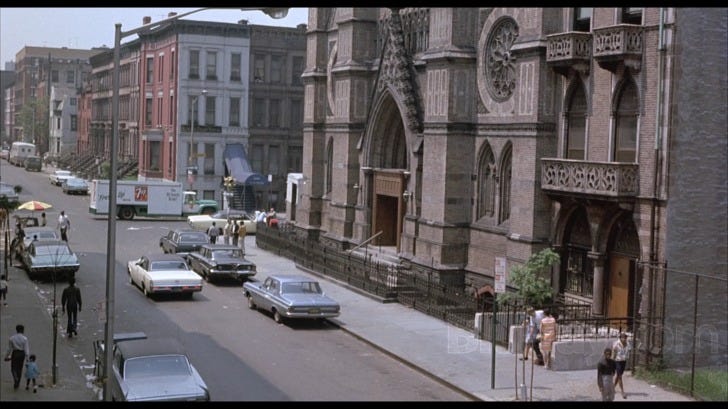Blaxploitation Education: Cotton Comes to Harlem
As the series continues, we get to the real first Blaxploitation movie
The Blaxploitation era kicked off in earnest with:
Cotton Comes to Harlem
Directed by Ossie Davis
Written by Chester Himes, Arnold Perl, and Ossie Davis
1970
While previous movies, such as the aforementioned UpTight, may have begun to focus on Black stories, it seems like this is the movie that really started the Blaxploitation movement. After it became a surprise box office success, the studios realized that Black people were willing to spend money to see movies with characters like them, and they started bankrolling more movies targeted at Black audiences. That seems like an obvious strategy, but it’s a pattern that continues to this day; remember when everybody was so surprised at how successful Black Panther was?
While this movie has some of the hallmarks that would come to be associated with Blaxploitation, it seems like much more of a comedy than many of the films that would come later. It’s an action/crime story, but it makes plenty of time for goofy gags and general silliness. The story mostly follows a couple cops named Grave Digger Jones (Godfrey Cambridge, who will be starring in our next entry) and Coffin Ed Johnson (Raymond St. Jacques, who was also in UpTight). It was adapted from a novel that was part of a long-running series about the characters by Chester B. Himes, who collaborated on the screenplay. Here, they’re on the hunt for some missing money and looking to take down a crooked preacher, and they get to be pretty badass when doing it, engaging in car chases, shootouts, and plenty of other tough-guy stuff.
The story involves the aforesaid preacher, Deke O’Malley (Calvin Lockhart), who is selling phony tickets to residents of Harlem (and other Black communities in Chicago and Detroit) that will supposedly let them migrate to Africa on a ship called the “Black Beauty.” When his rally gets robbed at gunpoint by a bunch of guys in masks, they take off with $87,000 of the people’s money, and everybody spends the rest of the movie chasing it around town. Turns out it got hidden in the bale of cotton that gives the movie its title, which ends up being harder to lay one’s hands on than you would expect.
The robbery turns into a crazy car chase that sets the tone for the movie, with all sorts of shenanigans happening as Digger and Coffin Ed drive through Harlem exchanging bullets with the bad guys. There’s a dope fiend who wanders out into the street just in time to get spun around by the speeding vehicles, an undertaker who rushes into his funeral parlor to put on a suit when he sees the cars zooming by, a guy hitting on some sexy ladies who get surprised by stray bullets, and so on. It’s all funny stuff, but it sort of undercuts the seriousness of the story in which our heroes are trying really hard to find justice for the people who have been taken advantage of.
That justice involves attempting to track down the missing reverend by intimidating his girlfriend Iris (Judy Pace, who would later appear on Sanford & Son, What’s Happening!!, and Good Times). They leave her under the supervision of a dorky white cop, who she seduces and ends up tricking into chasing her through the building naked with a paper bag on his head. They also track down a junkie (played by Cleavon Little, from Blazing Saddles) whose partner was killed in the car chase and who identifies the perpetrators of the robbery as white guys. How did he know they were white when they were wearing masks? “They run white, dammit!”
The cotton ends up getting found by Uncle Bud (Redd Foxx, playing a junk dealer even before he was on Sanford & Son), but he sells it to a guy for $25, then buys it back when he learns what’s inside it. Unfortunately, this places him in the path of the robbers, who apparently kill him (Or do they? A funny little coda to the movie reveals what actually happened to him, a revelation that’s pretty family-unfriendly for a guy who would become a cuddly sitcom star). After even more mix-ups, the cotton ends up in an especially unlikely place: as a prop for a mammy-themed striptease performed at the Apollo Theater.
Meanwhile, Digger and Coffin Ed track down O’Malley and work out the scheme, in which he was actually teaming with the robbers, planning to split the money and get away. But they all end up turning on each other, leading to various killings, chases, and scenes of violence. It all works out in the end, but it’s full of goofy moments along the way. There’s enough seriousness to give everything stakes, what with so many people deserving to get back the money they gave away to a con man, but at the same time, it doesn’t seem like there’s any chance that our heroes will come anywhere close to failure.
A lot of the character work here is pretty broad, with plenty of people coming close to mugging or playing ridiculous stereotypes. However, Cambridge and St. Jacques hold everything together by taking their roles seriously and being general badasses. Their characters are laser-focused on doing the right thing, even if they have to bend the rules a bit. They’re not interchangeable cop characters either; Coffin Ed is a bit of a hardass, seeming to always be on the edge of exploding into anger, while Digger spends most of the movie with a smirk on his face, constantly ready with a witty quip or an insult to crooks and authority figures alike. They play it as a couple of guys who are known around the neighborhood as fighters for justice, even if working inside the system gets them called Uncle Toms by the local Black revolutionaries.
Ultimately, this is a pretty entertaining romp, with just enough specificity to know that it was made by members of the community being portrayed. There are plenty of shots of Harlem in 1970 that ground the movie in its specific time and place, and the whole thing conveys a righteous anger at those who would take advantage of people who have already had to endure the worst injustices that humanity has had to offer. It’s fun to see some of the seeds that would really take root and grow into a full-fledged genre. I’m looking forward to seeing what comes next.




